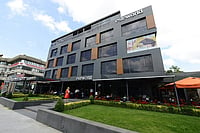TO “Guard against GERD”, you and your doctor will determine the course of treatment for your GERD.
Exercise and reducing weight can be especially helpful for people with GERD.Reducing foods high in fat can help reduce calories while decreasing the risk of GERD.
Gastroesophageal reflux disease, or GERD, is a digestive disorder that affects the lower esophageal sphincter (LES), the ring of muscle between the esophagus and stomach characterized by the backflow of stomach acids in the esophagus. In most cases, GERD can be relieved through diet and lifestyle changes; however, some people may require medication or surgery.
To prevent GERD
Instead of eating three large meals a day, cut your eating pattern into small frequent food portions.
Take smaller bites. Chew your food thoroughly before swallowing.
Gravity plays a vital role in controlling reflux. Maintaining an upright posture until the meal is digested may prevent heartburn.
If heartburn occurs regularly at night, consider raising the head of the bed or inserting a triangular wedge to keep your esophagus above the stomach.
Don't lie down within 2 hours of eating.
The first step is to reduce your daily calorie intake. Reducing foods high in fat can help reduce calories while decreasing the risk of GERD. Food items like fried, greasy food, whole milk dairy product, chocolate, alcohol, spicy food, citrus foods, carbonated drinks, and tobacco should be avoided. Exercise and reducing weight can be especially helpful for people with GERD. Walking after a meal helps in calorie burning and digestion. This way, you are less likely to lie down after a meal and risk further stomach acid reflux.
Alterations to one's diet and lifestyle are usually sufficient to treat GERD, although medication or surgery may be necessary for extreme situations. Even yet, it is vital to be aware of the pitfalls and learn to avoid them.
Issued in Public Interest by Dr.Reddy's Laboratories LTD






















